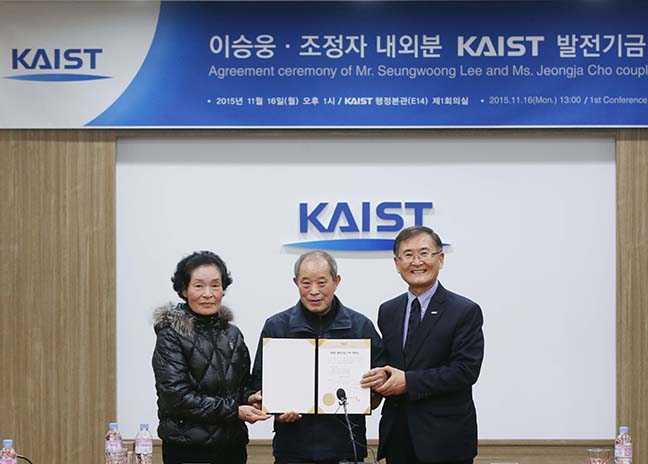fund
“We’ve made a real effort to save our money, but can’t spend it all just on ourselves. Please use it to foster talented students in the field of science, who will enrich our country,” said donors at the donation ceremony held today on campus.
A married couple in their 70s donated their real estate, worth approximately USD 6.41 million, to KAIST on November 16, 2015. Seung-Woong Lee, the husband, and Jeong-Ja Cho, his wife, turned over three properties, including buildings in Seoul and Uijeongbu, to the university.
The couple made a promise to themselves to return their assets back to the Korean society since the beginning of their marriage life. They decided that KAIST was the institution with the most potential to contribute to Korea’s growth. This spring they took that step.
The Lee couple said, “We strove to be frugal to gather such a sum of money. We engaged in all sorts of jobs after we left for Seoul from the countryside when the nation was impoverished.”
Mr. Lee said, “On one snowy winter day, I was riding a bicycle on my way back home. Then I saw a restaurant and, at that moment, I yearned for a bowl of soup in such cold weather. But I just rode past because the whole family could eat with the money that I would spend for the soup.”
Ms. Cho said, “At the beginning, I was rather unhappy with my husband’s very frugal personality. But as time passed, I noticed I had become just like him.” She added, smiling, “I often wandered around the market to get even the smallest discounts, and the shops sometimes refused to sell me the goods.”
Their assets are the result of that work ethic and humility. The couple said, “Today is definitely the happiest day of our life because we would keep our promise. We hope that KAIST will foster outstanding talents in the field of science and technology, students who will advance our nation in the future.”
President Steve Kang of KAIST said, “I would like to express my most sincere gratitude toward to this generous couple who have donated their lifetime assets so willingly to KAIST. Their invaluable support will surely become our springboard to continuously pursue our excellence in science and technology.”
In the picture from left to right are Ms. Jeong-Ja Cho (wife), Mr. Seung-Woong Lee (husband), and President Steve Kang.

-
event KAIST’s RAIBO2 becomes the World’s First Robo-dog to Successfully Complete a Full-course Marathon
KAIST's quadrupedal walking robot "RAIBO", which can run seamlessly on sandy beaches, has now evolved into "RAIBO2"and achieved the groundbreaking milestone by becomeing the world's first quadrupedal robot to successfully complete a full-course marathon in an official event. < Photo 1. A group photo of RAIBO2 and the team after completing the full-course marathon > KAIST (President Kwang Hyung Lee) announced on the 17th of November that Professor Je Min Hwangbo's research team of t
2024-11-17 -
research KAIST Unveils New Possibilities for Treating Intractable Brain Tumors
< Photo 1. (From left) Professor Heung Kyu Lee, KAIST Department of Biological Sciences, and Dr. Keun Bon Ku > Immunotherapy, which enhances the immune system's T cell response to eliminate cancer cells, has emerged as a key approach in cancer treatment. However, in the case of glioblastoma, an aggressive and treatment-resistant brain tumor, numerous clinical trials have failed to confirm their efficacy. Korean researchers have recently analyzed the mechanisms that cause T cell exhaus
2024-11-15 -
event KAIST’s Beach-Roaming Quadrupedal Robot “RAIBO” to Run a Marathon!
“RAIBO”, KAIST’s four-legged robot featuring remarkable agility even on challenging terrains like sandy beaches, is now set to be the first in the world to complete a full marathon. < Photo 1. A group photo of the research team of Professor Je Min Hwangbo (second from the right in the front row) of the Department of Mechanical Engineering who participated in the marathon event at 2024 Geumsan Insam Festival last September > On the 17th of November, KAIST (represen
2024-11-15 -
research KAIST Researchers Suggest an Extraordinary Alternative to Petroleum-based PET - Bacteria!
< (From left) Dr. Cindy Pricilia, Ph.D. Candidate Cheon Woo Moon, Distinguished Professor Sang Yup Lee > Currently, the world is suffering from environmental problems caused by plastic waste. The KAIST research team has succeeded in producing a microbial-based plastic that is biodegradable and can replace existing PET bottles, making it a hot topic. Our university announced on the 7th of November that the research team of Distinguished Professor Sang Yup Lee of the Department of Ch
2024-11-08 -
research KAIST Researchers Introduce New and Improved, Next-Generation Perovskite Solar Cell
- KAIST-Yonsei university researchers developed innovative dipole technology to maximize near-infrared photon harvesting efficiency - Overcoming the shortcoming of existing perovskite solar cells that cannot utilize approximately 52% of total solar energy - Development of next-generation solar cell technology with high efficiency and high stability that can absorb near-infrared light beyond the existing visible light range with a perovskite-dipole-organic semiconductor hybrid structure &l
2024-10-31